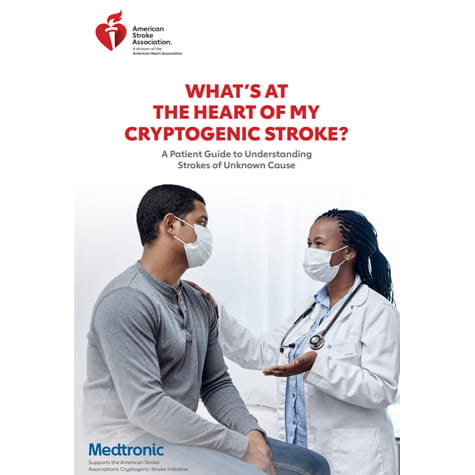Cryptogenic Stroke or Stroke of Unknown Cause

A Patient’s Guide to Understanding Strokes of Unknown Cause
In this guide, we provide detailed information for you and your loved ones to find answers about cryptogenic stroke.In most cases, a blood clot that blocks blood flow to the brain causes a stroke. But in some instances, the cause can’t be determined. Strokes without a known cause are called cryptogenic.
About 1 in 4 stroke survivors will likely have another stroke. That’s why it’s important for a health care team to find a definitive diagnosis and potential risk factors to provide targeted treatment to prevent recurrent strokes. So be sure to work with your health care team.
The information and resources below are for you and your loved ones to partner with your health care team and find answers about cryptogenic stroke.
It’s estimated that about 1 in 3 ischemic strokes are cryptogenic.
Some studies suggest that the incidence of cryptogenic stroke is higher in African- Americans (two times more likely) and Hispanics (46% more likely).
Possible Hidden Causes of Stroke
- Irregular heartbeat (atrial fibrillation) – AFib patients are at a 5 times greater risk for stroke.
- Heart structure problems (such as patent foramen ovale)
- Hardening of the arteries (large artery atherosclerosis)
- Blood clotting disorder (thrombophilia)
During your hospital stay and follow-up care, discuss with your health care professional ways to best treat and prevent another stroke. Some of these discussions may include diagnostic testing, blood workups and lifestyle changes.
While the cause of your stroke may not yet be determined, it’s important to follow your physician’s medical advice and take your medications. If you receive a heart monitoring device, follow regimens prescribed.
Also, you may reduce your risk factors for stroke by following a healthy lifestyle through the AHA’s Life’s Essential 8.
When the root cause of a stroke is still unknown after routine evaluation, it’s important to dig deeper for a definitive diagnosis. Collaboration by neurologists, cardiologists, electrophysiologists and other integral team members may reveal the answers to provide targeted treatment for preventing recurrent strokes.
Cryptogenic Stroke Patient Resources
- The Known and Unknown of Stroke Infographic (PDF)
- A Patient Guide to Understanding Strokes of Unknown Cause (PDF)
- Waiting Room Poster (PDF)
- What Causes Stroke Animated Video (Video)
- Cryptogenic Stroke Survivor Story Overcoming the Unknown (Video)
- Cryptogenic Stroke Collaborative Care Video Testimonial (Video)
- What to do when you have had a stroke of unknown cause (Video)
- I AM Determined to Prevent Another Stroke
- Five Key Facts About Stroke




